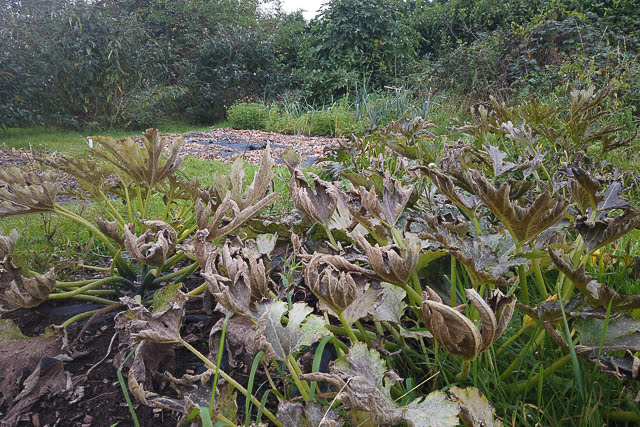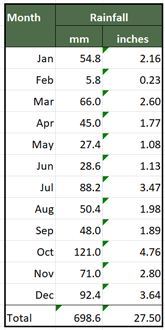It's been a cold and wet start to October in fact one of the wettest and coldest starts I've recorded.
 |
| October Average Temperatures 2010-2019 |
As you can see from the table above, colour coded red to blue indicating hottest to coldest, it's almost the coldest start to October with only 2012 marginally colder after the first 8 days of the month. It was cold enough on the third of the month for a touch of frost which finished off our courgettes.
It has been the wettest start to October I've recorded as indicated in the table below.
 |
| October Rainfall Totals 2010-2019 |
The rain has meant that the beds on the allotment have gone from too dry to dig to too wet in the space of about two weeks. Autumn digging is on hold until the soil dries out a little bit. I know that digging over the ground now when its too wet will lead to problems in spring and it will be difficult to prepare the soil for sowing and planting.
That doesn't mean that all allotment jobs are on hold and beds can still be cleared of their summer crops and the cleared vegetation added to the compost heap. We've been thinking all summer about clearing our honeyberry fruit bushes which over the last six or seven years that they've been planted haven't produced us a single honeyberry. They are going to be cleared to make way for some new gooseberry bushes.
It's a patch of the allotment that has become rather neglected due to the fact that it has been very unproductive. The cobnut and hazel tree growing nearby have been cut back. Both trees produce cobnuts but these are eaten by the squirrels long before the nuts are ready to pick.
Whilst the trees have been cut back the honeyberry bushes still need to be cut back and dug up. It's one of those jobs on the allotment where the cutting back doesn't take too long at all it's the sorting out of all the debris that takes the time.
I’ve now got a large heap of hazel and cobnut branches to sort out. Many of the branches will make some excellent sturdy bean poles for next year and the smaller branches will make some fine pea sticks. Any left over material that isn't suitable for the compost heap will hopefully be burnt on a bonfire later in autumn.
Meanwhile we need some decent weather to dry out the ground and dry off some of the prunings that will need to be burnt.






























Had to look up honeyberry, ah, fruit of a honeysuckle, makes sense; not mine, though, which is black and a japonica. Birds'll sometimes eat them. Poop is staining and black. Squirrels or rather one squirrel consumed every single nut on my almond tree, so gave up on it after a couple of years. Before the squirrel found it, it had the most beautiful white blossoms in springtime.
ReplyDeleteThe nearest we've got to a honeyberry is looking it up. Sadly not a single berry in 6 years. Not sure how many squirrels have eaten our cobnuts, I suspect more than one but I've never seen more than one in the tree at a time. Nothing at all we can do to stop them though.
ReplyDelete